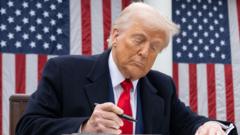In a surprising turn, President Trump has paused proposed tariff increases for 90 days, a move seen as a strategic retreat amidst economic pressures and investor anxiety. The decision opens the door for negotiations while keeping trade tensions with China at the forefront.**
**Trump Navigates Trade Tensions with Major Tariff Pause**

**Trump Navigates Trade Tensions with Major Tariff Pause**
**The President's recent decision to halt certain tariffs signals a shift in the trade war landscape, allowing for potential negotiations.**
In a surprising development, President Donald Trump announced a 90-day pause on the implementation of increased tariffs on numerous countries, a significant pivot after weeks of affirming a tough stance on trade. Initially, Trump's administration had publicly downplayed reports of the pause, but now it is clear the administration is reassessing its aggressive tariff strategy.
The stock market immediately reacted positively to this news, reflecting investor relief amid signs of growing anxiety over the potential impacts of an all-out trade war. Treasury Secretary Scott Bessent revealed that more than 75 nations have reached out to the U.S. in response to the tariff discussions, suggesting that the pause is part of a broader strategy to re-evaluate trade relationships.
Yet, the efficacy of this pause remains to be clarified, especially regarding which countries would be affected and whether the new tariff dynamics will take shape for the European Union, Canada, and Mexico, who had initially been spared. Hours passed before clearer details emerged, leaving many trading partners to speculate about the ramifications of Trump’s announcement shared via Truth Social.
As markets fluctuation could indicate both investor confidence and overall economic health, Trump's acknowledgment of the "glum" market conditions points to a recognition of the complex interplay of politics and economics in his decision-making process. Senate Minority Leader Chuck Schumer accused Trump of creating a chaotic trade environment, highlighting the ongoing opposition surrounding the administration’s approach to trade policy.
It's an evolving situation, where the U.S. appears to be attempting to mend ties with erstwhile trading partners while still upholding a combative posture against China, where tariffs now stand robustly at 125%. The key uncertainty is how Trump’s maneuvers will affect the broader global economic order and whether the upcoming negotiation phase will thaw the existing tensions or lead to renewed confrontations in just under three months.
The stock market immediately reacted positively to this news, reflecting investor relief amid signs of growing anxiety over the potential impacts of an all-out trade war. Treasury Secretary Scott Bessent revealed that more than 75 nations have reached out to the U.S. in response to the tariff discussions, suggesting that the pause is part of a broader strategy to re-evaluate trade relationships.
Yet, the efficacy of this pause remains to be clarified, especially regarding which countries would be affected and whether the new tariff dynamics will take shape for the European Union, Canada, and Mexico, who had initially been spared. Hours passed before clearer details emerged, leaving many trading partners to speculate about the ramifications of Trump’s announcement shared via Truth Social.
As markets fluctuation could indicate both investor confidence and overall economic health, Trump's acknowledgment of the "glum" market conditions points to a recognition of the complex interplay of politics and economics in his decision-making process. Senate Minority Leader Chuck Schumer accused Trump of creating a chaotic trade environment, highlighting the ongoing opposition surrounding the administration’s approach to trade policy.
It's an evolving situation, where the U.S. appears to be attempting to mend ties with erstwhile trading partners while still upholding a combative posture against China, where tariffs now stand robustly at 125%. The key uncertainty is how Trump’s maneuvers will affect the broader global economic order and whether the upcoming negotiation phase will thaw the existing tensions or lead to renewed confrontations in just under three months.





















